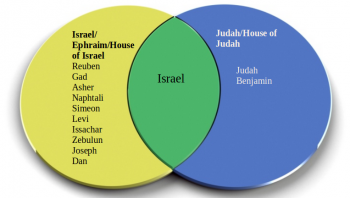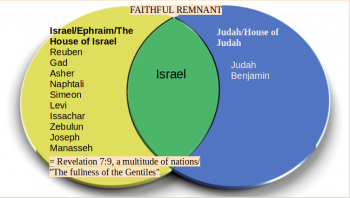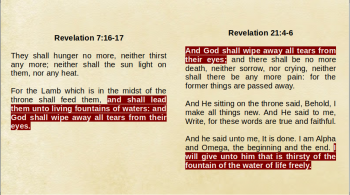Since the late 1800's there has been a growing tendency among Christians to retain an unwarranted awareness of genetic ancestry in their identification of Israel. It's almost been entirely forgotten by some that the New Covenant makes genetic ancestry count nothing, but only faith in Christ, who is the seed of Abraham to whom all the promises pertain (Galatians 3:16) and in whom all the families of the earth are blessed (Genesis 12:3; Genesis 28:14). These first four posts in this thread will make this fact abundantly clear.
This is going to have to be divided into 4 posts, because it involves a great deal of Biblical information which we have all been given, but it's time this heresy of "two Israels" - i.e one the genetic seed and one the church - be exposed for the lie that it is.
Genesis 17:3-6
"And Abram fell on his face. And God talked with him, saying, As for Me, behold! My covenant is with you, and you shall be a father of many nations (gôy). Neither shall your name any more be called Abram, but your name shall be Abraham. For I have made you a father of many nations (gôy). And I will make you exceedingly fruitful, greatly so, and I will make nations of you, and kings shall come out of you."
[Strongs Hebrew Dictionary H01471] gôy Apparently from the same root as H1465 (in the sense of massing); a foreign nation; hence a Gentile; also (figuratively) a troop of {animals} or a flight of locusts: - {Gentile} {heathen} {nation} people.
When Jacob (the father of the twelve tribes of Israel) was on his death-bed and was prophesying to his son, Joseph, regarding Joseph's elder son, Manasseh, and younger son, Ephraim, this is what he said:
Genesis 48:19 Young's Literal Translation
And his father refuseth, and saith, `I have known, my son, I have known; he (Manasseh) also becometh a people, and he also is great, and yet, his young brother (Ephraim) is greater than he, and his seed is the fulness of the nations (gôy);'
"The fulness of the nations" (in the Hebrew in which it was written) is a translation of the Hebrew words melô' (fullness), and gôy (Gentiles).
[Strongs Hebrew Dictionary H04393] melô' From H4390; fulness (literally or figuratively): - X all {along} X all that is (there-) {in} {fill} (X that whereof . . . was) {full} {fulness} [hand-] {full} multitude.
In the KJV and most English translations, melô and gôy are translated as "a multitude of nations":
Genesis 49:19
"And his father refused, and said, I know it, my son, I know it: he also shall become a people, and he also shall be great: but truly his younger brother shall be greater than he, and his seed shall become a multitude of nations." (Updated King James Version).
Israel split into two kingdoms after the time of king Solomon: The northern kingdom of Israel, and the southern kingdom of Judah. From then onward if the prophets were speaking about all of Israel, it would include both:-
(a) The ten northern tribes of the kingdom of Israel, which are (frequently) collectively called Ephraim in scripture, but also called "the house of Israel"; and
(b) The two southern tribes (Judah a.k.a the Jews, and Benjamin, whom scripture frequently calls Judah or "the house of Judah".
This is going to have to be divided into 4 posts, because it involves a great deal of Biblical information which we have all been given, but it's time this heresy of "two Israels" - i.e one the genetic seed and one the church - be exposed for the lie that it is.
MANY NATIONS
Genesis 17:3-6
"And Abram fell on his face. And God talked with him, saying, As for Me, behold! My covenant is with you, and you shall be a father of many nations (gôy). Neither shall your name any more be called Abram, but your name shall be Abraham. For I have made you a father of many nations (gôy). And I will make you exceedingly fruitful, greatly so, and I will make nations of you, and kings shall come out of you."
[Strongs Hebrew Dictionary H01471] gôy Apparently from the same root as H1465 (in the sense of massing); a foreign nation; hence a Gentile; also (figuratively) a troop of {animals} or a flight of locusts: - {Gentile} {heathen} {nation} people.
FULLNESS OF THE GENTILES
When Jacob (the father of the twelve tribes of Israel) was on his death-bed and was prophesying to his son, Joseph, regarding Joseph's elder son, Manasseh, and younger son, Ephraim, this is what he said:
Genesis 48:19 Young's Literal Translation
And his father refuseth, and saith, `I have known, my son, I have known; he (Manasseh) also becometh a people, and he also is great, and yet, his young brother (Ephraim) is greater than he, and his seed is the fulness of the nations (gôy);'
"The fulness of the nations" (in the Hebrew in which it was written) is a translation of the Hebrew words melô' (fullness), and gôy (Gentiles).
[Strongs Hebrew Dictionary H04393] melô' From H4390; fulness (literally or figuratively): - X all {along} X all that is (there-) {in} {fill} (X that whereof . . . was) {full} {fulness} [hand-] {full} multitude.
In the KJV and most English translations, melô and gôy are translated as "a multitude of nations":
Genesis 49:19
"And his father refused, and said, I know it, my son, I know it: he also shall become a people, and he also shall be great: but truly his younger brother shall be greater than he, and his seed shall become a multitude of nations." (Updated King James Version).
ISRAEL
Israel split into two kingdoms after the time of king Solomon: The northern kingdom of Israel, and the southern kingdom of Judah. From then onward if the prophets were speaking about all of Israel, it would include both:-
(a) The ten northern tribes of the kingdom of Israel, which are (frequently) collectively called Ephraim in scripture, but also called "the house of Israel"; and
(b) The two southern tribes (Judah a.k.a the Jews, and Benjamin, whom scripture frequently calls Judah or "the house of Judah".
Last edited:




